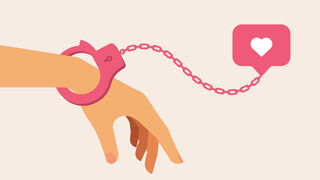Beauty
Why Some People Settle for a Seasonal Partner
Seeking companionship when touch and warmth are in demand.
Posted December 16, 2021 Reviewed by Michelle Quirk
Key points
- Cuffing is defined as attaching yourself to someone just for the cold winter months.
- For our ancestors, the company of others would have provided warmth and protection.
- There are changes in male preferences for women's bodies across the seasons.

Does the effort you invest in seeking a romantic partner intensify as we reach the winter? During the winter, people have been known to engage in "cuffing," which means attaching yourself to or making physical contact with someone just for the cold winter months. You know this is not going to be a long-term thing. It is called cuffing because it refers to wanting to be bound, attached, or cuffed to someone. In the Northern hemisphere at least, such behaviour begins in October and ends around Valentine’s Day.
Evolutionary, Psychological, and Biological Explanations
In evolutionary terms, cuffing may have occurred because, as the winter months are cold and dark, it would have been a good strategy for our ancestors to seek out the company of others during these months, when they could potentially die from exposure to the cold and where the dark may have left them more vulnerable to attack from predators. For our ancestors, the company of others would have provided warmth and the advantage of someone to protect them.
Cuffing behaviour might also be explained, at least for men, by variation in testosterone levels, which tend to be lowest in the months with the highest temperatures and most daylight and highest in the winter months. This increase in testosterone levels in men during the winter months might motivate them to increase their efforts in seeking out and looking for the company of sexual partners.
In support of this, Pawlowski and Sorokowski (2008) noted that men’s judgments of female attractiveness also changed seasonally. In their study, they employed 114 heterosexual men who were asked to assess the attractiveness of women’s photographs over five different seasons. The photographs featured waist–hip ratio variations, photos of female breasts, and photos of average-looking faces of women. The researchers found changes in male preferences for body shape and breast attractiveness across the seasons. However, there was no change for ratings of faces. The men gave the highest attractiveness scores in the winter, with the lowest scores being given in the summer. The researchers suggest that this is because, in the summer or warmer months, men are exposed to women’s uncovered bodies more than in the winter, therefore becoming used to seeing women in this way and giving lower attractiveness ratings. Conversely, in the winter months, they are less frequently exposed to women’s bodies and accordingly judge their attractiveness more highly.
Maybe cuffing is also associated with a need for touch. Affectionate touching such as hugging or holding hands generally lowers cortisol secretion (associated with high blood pressure and irritability) while increasing the release of oxytocin (the hormone associated with bonding). When our body releases oxytocin, we feel more relaxed and happy and generally experience a better mood.
Holiday Companionship
Despite the evolutionary, psychological, and biological explanations, cuffing may simply be explained by the fact that during the winter months we are more likely to go to parties and visit friends, for Thanksgiving, Christmas, and the New Year, and simply want a partner to take along with us.
Remember that if you have decided to be cuffed for the winter months, consider what happens after the cuffing season. Do you have plans together after the winter? Did you experience a sense of urgency in getting together with your cuffing partner? Are you the kind of person who generally cuffs? Ideally, you should try to be discerning and not rush into things. Try not to date out of sheer boredom or loneliness, and ask yourself if you really like the person with whom you intend to be cuffed. On the bright side, there is of course no reason why your connection with the person with whom you have chosen to cuff should not develop into a long-term relationship beyond the spring.
Facebook image: YAKOBCHUK VIACHESLAV/Shutterstock
References
Pawlowski B., & Sorokowski, P. (2008). Men's attraction to women's bodies changes seasonally. Perception, 37, 1079–1085.


